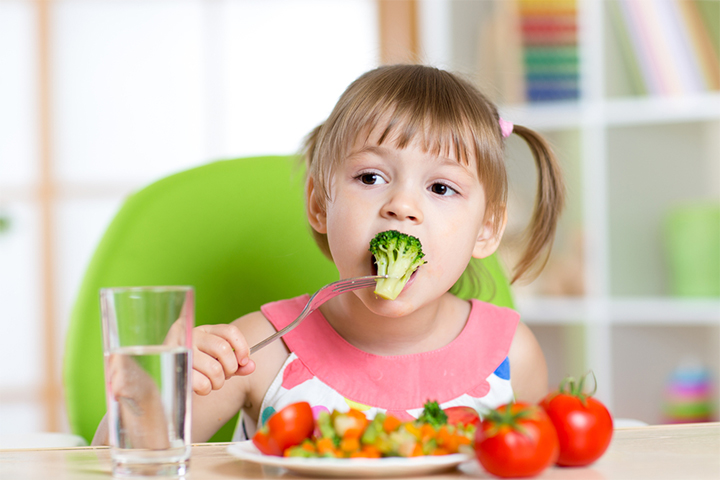
Image: Shutterstock
Not all kids are fussy eaters, but some of them do test your patience at the dining table. Being a parent to such kids makes you feel like 90% of your energy goes into preparing meals for your kids and trying your best to shove food into their mouths. However, this will only make your kids hate meal times, which is not something you want to do. This article explains some expert ways to help your kids eat healthily. Read on to know them all!
1. Make Them Feel Appreciated
Image: Shutterstock
Having a designated seat at the dinner table might encourage picky eaters to try new foods. Prepare a special meal for them with dishes that they will enjoy. Suction plates bowls can be used to reduce the amount of clutter after meals. The plates have a suction cup bottom to keep them from being knocked to the floor by curious tiny fingers, and the bright colors and designs are sure to be a hit with the kids.
2. Don’t Stand On Their Head
Image: Shutterstock
How likely are you to comply if someone insists that you eat just one more mouthful of your lunch? You should instead employ the “Division of Responsibility ” approach to feeding, in which the parents are in charge of the what, when, and where to feed, but the kid is responsible for the quantity and frequency of eating. This strategy not only improves your child’s self-esteem but also promotes greater self-regulation of eating as they age.
3. Serve A Variety Of Food
Image: Shutterstock
It’s possible that your kid is tired of the same old thing. Make sure to keep things exciting by switching things up regularly by adding or modifying ingredients. Your kid may be more willing to try the food in a more comfortable environment.
4. Don’t Negotiate With What They Can Eat
Image: Shutterstock
Many children value autonomy over food and refuse to consume anything new or different. Refusing an item, even if it’s one they’ve had before and like, is a way of stating, “You’re not the boss of me.” Rather than using pressure techniques like “Just take one taste!” or “You can have pie if you try it,” try saying something as simple as, “This is what we’re having for dinner tonight.” Since there’s no debate, you don’t have to worry about setting off their “Don’t tell me about what to do!” alarm.
5. Serve Meals In Courses
Image: Shutterstock
True hunger motivates even the most seasoned grownups to nosh. Children are less likely to resist trying something new if they are hungry, even if they are wary of the components. You may use the “appetizer” course to introduce fresh meals, such as veggies. If they don’t finish, you can always provide something you know they’ll eat to ease your mind.
6. Involve Them In The Meal Preparation
Image: Shutterstock
As you may have seen, toddlers have a particular fondness for anything that is theirs. Giving them a hand in making their meals offers them a feeling of accomplishment and encourages them to try new things. Even if it slows you down or makes a bigger mess to prepare meals with your children at their sides, find ways to include them. Even a toddler can help decide what to eat for dinner, and they could choose vegetables. And if your kid begs to try an uncooked fruit or vegetable, give in. Each new flavor is an opportunity to teach them to like more.
7. Cut Out On Frequent Snacks
Image: Shutterstock
A hungry child is more open to trying new meals. However, if your child has a banana and a milk-based beverage (or perhaps a granola bar and just a glass of milk or a mouthful of popcorn and a drink of juice) an hour before dinner they will probably protest. In that case, it’s unlikely they’ll be genuinely hungry and more likely to refuse to eat what you provide. Do your best to maintain a regular eating routine.
8. Teach By Example
Image: Shutterstock
Even if kids don’t always do what they’re told, they’ll almost always do what they see you do. You should lead by example if you want your kid to grow up to be a healthy eater. Choose a new cuisine that the whole family can enjoy in various ways throughout the week.
Most kids go through very uniform stages of eating. They don’t require as much food as their parents would assume after the age of two when growth rates have stalled, and parents may observe an increase in their picky eating habits. Maintain a pleasant mealtime atmosphere by offering a wide selection of healthy foods in an unhurried setting. Don’t worry. This, too, will go. Reduced pressure to eat well now will increase the likelihood that their tastes will organically expand as they age.




















